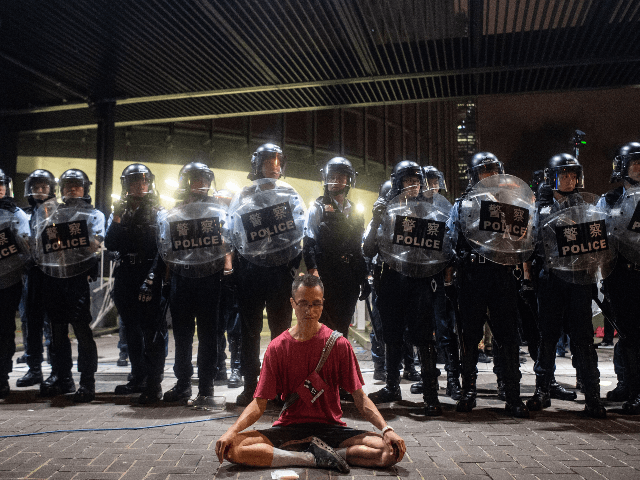Hong Kong protest organizers on Thursday sarcastically invited supporters to schedule a “weekend getaway” at the international airport and give the facility a “stress test” on Sunday and Monday by blocking off the roads and overloading the railway system.
A similar effort failed to achieve gridlock last weekend, but airport officials say they are prepared to cancel flights as needed.
The South China Morning Post explained that organizers are not calling for a march, rally, or hostile occupation of the airport, tactics which could provoke a preemptive response from the police. They just want people to show up, hang out, and give visitors a favorable impression of the protest movement to counter the accusations of violence and mayhem leveled by city officials and the mainland Chinese government. According to the report:
Organizers suggested citizens cycle, hike, go for a drive, have a picnic or do some plane-spotting in the area. If all transport to the airport is stopped, there is no reason to continue the stress test, they said.
“We hope to use this opportunity to tour around the area, welcome visitors to Hong Kong, as well as to express our apologies and share more about the movement with foreigners,” the organizers said.
“We call for all Hong Kong citizens to come to the unrestricted areas of the airport with a humble and peaceful attitude. We hope to restore Hong Kong’s reputation as a tourist-friendly city.”
While some protesters called for the airport movement to be indefinite, organizers said they had only planned action for two days.
“But if our government continues to openly disregard public opinion and reject the five demands, it is likely the airport stress test will be held every weekend from now on, and we cannot rule out the chances of an escalation,” they said.
The “five demands” of the protest movement begin with permanent withdrawal of a bill that would make extradition to China easier and end with a demand for true representative democracy in Hong Kong. Chief executive Carrie Lam once again rejected all of these demands in her latest public statement on Tuesday.
A massive protest two weeks ago virtually closed the airport down, prompting city officials to obtain a court order banning deliberate obstruction of the facility or the roads leading to it. A relatively small area for legal demonstrations was designated by the order. The vague invitation to a weekend of frolic issued by protest organizers sidestepped the court order by refraining from demands for organized demonstrations or a deliberate blockade.
A crackdown against the protesters seemed to gain momentum on Friday with the arrest of several pro-democracy activists and the cancellation of a major protest march scheduled for Saturday. By issuing a vague appeal to supporters, movement leaders were able to avoid setting up a discrete event that they might be compelled to cancel.
Hong Kong International Airport (HKIA) officials on Friday discussed plans to scale back takeoffs and landings, cancel flights, or even shut down the airport entirely as needed, due to concerns that the “stress test” demonstration might shut down road and rail transportation out of the airport, leaving travelers trapped inside.
“Passengers are advised to allow sufficient time to travel to the airport. Passengers may also check with their respective airlines, or visit the airport’s website and ‘HKG My Flight’ mobile app for updated flight information,” the Airport Authority said in a public notice.
The protest movement is definitely having a negative impact on Hong Kong’s extremely busy airport, with double-digit booking declines reported by several major airlines. Several companies have suggested they might need to cut working hours or put staffers on unpaid leave due to lost ticket revenue. Hong Kong’s premier carrier Cathay Pacific is under especially strong pressure from both the pro-democracy movement and the Communist Chinese government.
On Wednesday, the Hong Kong Confederation of Trade Unions (HKCTU) blasted Cathay for firing at least 20 employees who were seen as sympathetic to the protest movement. The Chinese government pressured Cathay into forcing out its highly successful CEO, Rupert Hogg, and threatened to ban Cathay planes from entering mainland Chinese airspace if their crews included protest sympathizers.

COMMENTS
Please let us know if you're having issues with commenting.